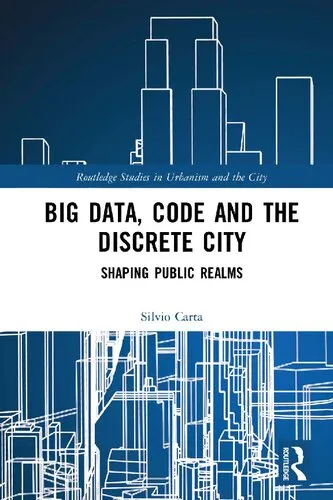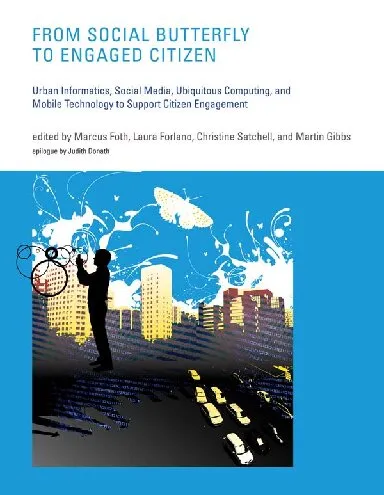Big Data, Code and the Discrete City: Shaping Public Realms
4.5
بر اساس نظر کاربران

شما میتونید سوالاتتون در باره کتاب رو از هوش مصنوعیش بعد از ورود بپرسید
هر دانلود یا پرسش از هوش مصنوعی 2 امتیاز لازم دارد، برای بدست آوردن امتیاز رایگان، به صفحه ی راهنمای امتیازات سر بزنید و یک سری کار ارزشمند انجام بدینکتاب های مرتبط:
معرفی کتاب "Big Data, Code and the Discrete City: Shaping Public Realms"
کتاب "Big Data, Code and the Discrete City: Shaping Public Realms" نوشته سیلویو کارت به بررسی رابطه میان فناوریهای پیشرفته مانند Big Data، Code و تأثیرات آن بر شکلدهی فضاهای عمومی شهری میپردازد. این کتاب درکی عمیق از چگونگی تعامل طراحی، معماری و فناوری اطلاعات در شکلدهی زندگی روزمره در شهرهای مدرن ارائه میکند.
خلاصهای از کتاب
کتاب "Big Data, Code and the Discrete City" به موضوعات مختلفی پرداخته که همگی رابطهای تنگاتنگ با تغییرات دیجیتال و چگونگی طراحی فضاهای عمومی آینده دارند. نویسنده توضیح میدهد که چگونه فناوری Big Data و تکنیکهای تجزیه و تحلیل آن میتوانند شهرها را نه تنها از نظر معماری، بلکه از دیدگاه اجتماعی و فرهنگی متحول کنند. این کتاب به تفصیل به رابطه میان طراحی فناوریمحور و ساختارهای ساکن شهری پرداخته و تأثیرات اصلی این رابطه را مورد بررسی قرار میدهد.
نویسنده همچنین به موضوع مهم "Discrete City" یا "شهر گسسته" میپردازد که مفهومی نوین در مطالعات شهری به شمار میرود. مفهوم "گسسته" در اینجا به معنای ایجاد سیستمی از عناصر مستقل اما مرتبط است که بر اساس دادهها و الگوریتمها عمل میکنند. این امر به طراحان و شهرسازان امکان میدهد تا از رویکردهای سنتی فاصله گرفته و به طراحی فضاهایی بپردازند که قابلیت انطباق با نیازهای پویا و متغیر جامعه را داشته باشند.
نکات کلیدی کتاب
- تأثیر مستقیم Big Data بر فرآیند طراحی شهری و معماری.
- تحلیل مفهوم "Discrete City" و بررسی اصول بنیادین آن.
- چگونگی استفاده از Code برای مدیریت، طراحی و شبیهسازی فضاهای عمومی.
- رابطه میان شهرهای دیجیتال و مفاهیم انسانی مانند حریم خصوصی، دسترسپذیری و تعاملات اجتماعی.
- ارائه چشماندازهایی برای آینده فضاهای عمومی و نقش فناوری در شکلدهی آنها.
نقلقولهای معروف از کتاب
"Cities are not random entities—they are orchestrated spaces built on layers of data and code."
"Designing public realms in the age of algorithms demands an understanding of both technology and humanity."
"The future of public spaces lies in their capacity to adapt, evolve, and resonate with the digital lives of their inhabitants."
چرا این کتاب اهمیت دارد؟
این کتاب نه تنها برای معماران و طراحان شهری، بلکه برای سیاستگذاران، دانشجویان، پژوهشگران و تمامی افرادی که به آینده فضاهای شهری علاقهمندند، از اهمیت بالایی برخوردار است. با پیشرفت فناوری و افزایش دسترسی به دادههای کلان، درک این تغییرات و تطابق با آنها امری حیاتی به شمار میرود.
سیلویو کارت در این کتاب به درستی نشان میدهد که چگونه میتوان میان فناوری و نیازهای انسانی تعادلی برقرار کرد. این کار نه تنها از دیدگاه علمی، بلکه از منظر اجتماعی نیز تحولی بنیادین در نوع زندگی و استفاده ما از فضاهای عمومی ایجاد میکند. به همین دلیل، این کتاب میتواند به عنوان منبعی ارزشمند برای درک بهتر شهرهای آینده و روشهای طراحی آنها مورد استفاده قرار گیرد.
Welcome to the introduction of "Big Data, Code and the Discrete City: Shaping Public Realms", a book that explores the transformative potential of big data and computational technologies in reshaping our urban environments and public realms. This work dives deep into the intersection between technology, architecture, and urban planning, offering actionable insights into the ways digital tools and algorithms are influencing how cities evolve in the 21st century.
Detailed Summary of the Book
Cities are the physical manifestations of culture, economy, and human interaction, but in the contemporary era, they are increasingly influenced by the intangible forces of data and code. "Big Data, Code and the Discrete City" investigates how the confluence of technology and urbanism is reshaping public realms — the shared spaces where social interaction occurs and civic life flourishes.
The book starts by defining the concept of the "discrete city," a term that encapsulates how modular and data-driven systems break cities into smaller, quantifiable units. This shift enables urban designers to gather, process, and analyze vast amounts of real-time data, allowing for more precise and responsive planning strategies.
One of the core themes is the re-evaluation of public space and its meaning in an age dominated by algorithms and machine learning. As traditional notions of civic engagement transform, the book urges an interrogation of how inclusivity and accessibility can be maintained in digitally empowered spaces. By merging theoretical frameworks with case studies, it offers a balanced approach to understanding both the opportunities and constraints of employing big data in urban contexts.
Chapters delve into smart cities, algorithmic governance, spatial analytics, and their implications for democracy within the urban framework. The book's multidisciplinary perspective integrates insights from architecture, computer science, and urban sociology, ensuring a holistic exploration of these topics. By the end, readers will develop a nuanced understanding of the relationship between technological advancement and the responsibility to create equitable, humane urban environments.
Key Takeaways
- 1. The Discrete City Framework: Learn about how urban systems are being discretized into measurable units to enable more efficient urban development and planning.
- 2. Democratization of Urban Data: Understand the potential of big data to both enhance and challenge democratic processes in urban governance.
- 3. Computational Urbanism: Explore the impact of code and algorithms on shaping public spaces and the architectural fabric of cities.
- 4. Ethical Considerations: Grasp the ethical issues surrounding surveillance, privacy, and accessibility in data-driven urban design.
- 5. Future-Proofing Urban Spaces: Prepare for the role of artificial intelligence in the design, operation, and living experience of future cities.
Famous Quotes from the Book
"In the 21st-century city, data is more than infrastructure; it is the lifeblood, shaping not just how we plan our cities, but how we live in them."
"The true challenge lies not in the availability of data, but in translating it into actionable insights that benefit communities equitably and sustainably."
"Public space is no longer merely physical; it exists at the nexus of physical interactions and digital networks, necessitating a new paradigm of urban design."
Why This Book Matters
"Big Data, Code and the Discrete City: Shaping Public Realms" is more than just an academic study of technology and urbanism. It is a manifesto for reclaiming the human experience in a rapidly digitizing world. As cities embrace "smart" systems, there is an urgent need to ensure that the technological advancements do not come at the expense of equity, inclusivity, and civic identity. This book offers a critical lens to view emerging developments while equipping readers with the intellectual tools necessary to rethink urban futures.
For urban designers, architects, technologists, and policymakers, this book provides a timely guide to navigating the challenges of the 21st-century city. It bridges the gap between theoretical concepts and actionable strategies, ensuring that readers leave with both a deeper intellectual understanding and practical methods for shaping better cities.
Ultimately, this book matters because it advocates for a measured and inclusive approach to innovation — a reminder that while data and code can transform our world, they must do so in ways that prioritize the collective well-being and resilience of modern urban populations.
دانلود رایگان مستقیم
شما میتونید سوالاتتون در باره کتاب رو از هوش مصنوعیش بعد از ورود بپرسید
دسترسی به کتابها از طریق پلتفرمهای قانونی و کتابخانههای عمومی نه تنها از حقوق نویسندگان و ناشران حمایت میکند، بلکه به پایداری فرهنگ کتابخوانی نیز کمک میرساند. پیش از دانلود، لحظهای به بررسی این گزینهها فکر کنید.
این کتاب رو در پلتفرم های دیگه ببینید
WorldCat به شما کمک میکنه تا کتاب ها رو در کتابخانه های سراسر دنیا پیدا کنید
امتیازها، نظرات تخصصی و صحبت ها درباره کتاب را در Goodreads ببینید
کتابهای کمیاب یا دست دوم را در AbeBooks پیدا کنید و بخرید
1215
بازدید4.5
امتیاز50
نظر98%
رضایتنظرات:
4.5
بر اساس 0 نظر کاربران
"کیفیت چاپ عالی بود، خیلی راضیام"
Questions & Answers
Ask questions about this book or help others by answering
No questions yet. Be the first to ask!



